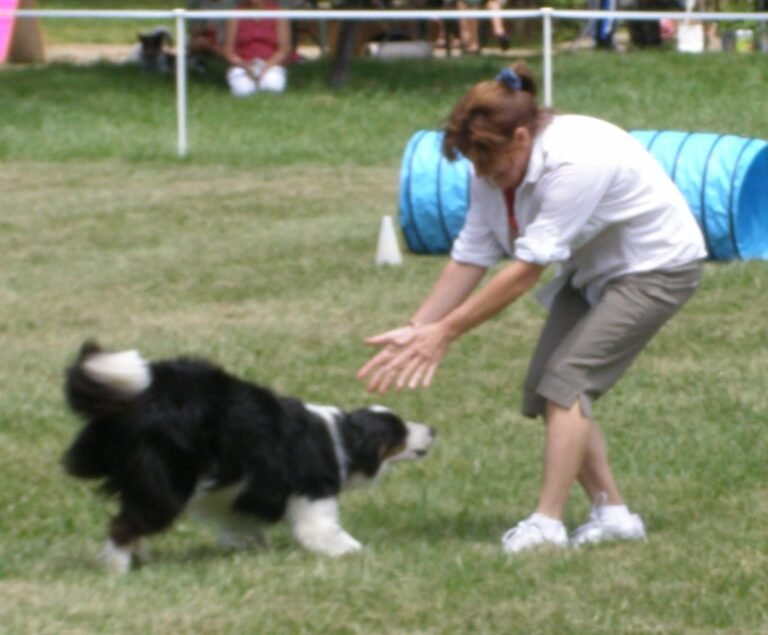Why Do Border Collies Bark A Lot
The Border Collie is a highly intelligent and energetic breed that was originally developed for herding livestock, particularly sheep, in the border regions between England and Scotland. They are known for their intense focus, agility, and strong work ethic. Border Collies are medium-sized dogs with a well-proportioned body and a distinctive “stare” that they use to control the movement of their flock. They have a double coat that can be either smooth or rough, and their coloring can range from black and white to red and white, with or without markings. Border Collies are known for their high energy levels and need for mental and physical stimulation. They are also highly trainable and excel in various dog sports and activities, such as agility, obedience, and flyball.
The natural instinct to herd and protect
Border Collies have a strong natural instinct to herd and protect, which can manifest in various behaviors, including nipping, chasing, and barking. This instinct is deeply ingrained in their genetic makeup and has been honed through centuries of selective breeding for working ability. When not given an outlet for their herding instincts, Border Collies may exhibit these behaviors in inappropriate ways, such as herding children, other pets, or even their owners. Additionally, their protective nature can lead to excessive barking in response to perceived threats or changes in their environment. It is important for Border Collie owners to understand and respect these natural instincts while providing appropriate outlets for their dog’s energy and drive.
Lack of mental and physical stimulation
One of the most common reasons for excessive barking in Border Collies is a lack of mental and physical stimulation. These dogs are highly intelligent and require regular mental challenges to keep them engaged and satisfied. Without proper stimulation, Border Collies may become bored and restless, leading to excessive barking as a way to release pent-up energy and frustration. It is important for owners to provide their Border Collies with plenty of opportunities for physical exercise, such as daily walks, runs, or playtime, as well as mental stimulation through training, puzzle toys, and interactive games. Engaging in activities that tap into their herding instincts, such as agility or herding trials, can also help satisfy their need for mental and physical stimulation.
Separation anxiety and boredom
Border Collies are known for their strong bond with their owners and can develop separation anxiety when left alone for extended periods. This can lead to excessive barking as a way to express their distress and seek attention. Additionally, boredom can exacerbate separation anxiety, as Border Collies may become restless and anxious when not given enough mental and physical stimulation. It is important for owners to gradually acclimate their Border Collies to being alone and provide them with plenty of mental and physical exercise to help alleviate boredom and anxiety. Providing interactive toys, such as puzzle feeders or treat-dispensing toys, can also help keep them occupied and mentally engaged while alone.
Communication and alertness
Border Collies are highly alert and responsive dogs that are quick to pick up on changes in their environment. They are known for their keen sense of observation and ability to communicate with their owners through body language and vocalizations. However, their alertness can also lead to excessive barking in response to perceived threats or changes in their surroundings. It is important for owners to understand their dog’s communication cues and provide reassurance and guidance when their Border Collie becomes anxious or agitated. Training and socialization can also help teach them appropriate ways to respond to stimuli and communicate with their owners.
Socialization and training
Proper socialization and training are essential for managing excessive barking in Border Collies. Early socialization helps them become accustomed to various people, animals, and environments, reducing the likelihood of fear-based barking. Positive reinforcement training can also help teach them appropriate behaviors and responses to different stimuli. Teaching them to focus on their owners and respond to commands can help redirect their energy and prevent excessive barking. Additionally, providing mental and physical exercise through activities such as agility, obedience, and herding trials can help satisfy their need for stimulation and reduce boredom-related barking.
Health issues and discomfort
Excessive barking in Border Collies can also be a sign of underlying health issues or discomfort. Pain, illness, or discomfort can cause dogs to vocalize as a way to communicate their distress. It is important for owners to monitor their dog’s behavior and seek veterinary care if they suspect any health issues. Regular veterinary check-ups and proper grooming can help ensure that their Border Collie is healthy and comfortable, reducing the likelihood of excessive barking due to physical discomfort.
Environmental triggers and stimuli
Border Collies are highly sensitive to their environment and can be triggered by various stimuli, such as loud noises, unfamiliar people or animals, or changes in routine. These triggers can lead to excessive barking as a way to express their anxiety or discomfort. It is important for owners to identify and manage these triggers, providing reassurance and guidance to help their Border Collie feel safe and secure. Creating a predictable routine and providing a safe space, such as a crate or designated area, can also help reduce anxiety and excessive barking in response to environmental triggers.
Genetic predisposition to barking
Some Border Collies may have a genetic predisposition to barking, which can be exacerbated by their herding instincts and alert nature. While barking is a natural form of communication for dogs, excessive barking can become problematic if not properly managed. It is important for owners to understand their dog’s breed tendencies and provide appropriate outlets for their energy and drive. Training and socialization can help teach them when it is appropriate to bark and when to be quiet, as well as redirect their energy into more productive activities.
Tips for managing excessive barking
There are several strategies that can help manage excessive barking in Border Collies. Providing regular mental and physical exercise, such as daily walks, runs, or playtime, can help satisfy their need for stimulation and reduce boredom-related barking. Engaging in activities that tap into their herding instincts, such as agility or herding trials, can also help provide an outlet for their energy and drive. Positive reinforcement training can help teach them appropriate behaviors and responses to different stimuli, as well as redirect their energy and prevent excessive barking. Creating a predictable routine and providing a safe space, such as a crate or designated area, can help reduce anxiety and excessive barking in response to environmental triggers. Additionally, seeking veterinary care and monitoring their dog’s behavior can help identify and address any underlying health issues or discomfort that may be contributing to excessive barking. Overall, understanding and respecting the natural instincts and tendencies of the Border Collie breed, while providing appropriate outlets for their energy and drive, can help manage and reduce excessive barking in these highly intelligent and energetic dogs.









